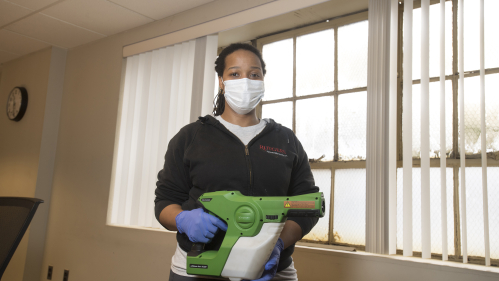
A Thank-You to Our Essential Workers
Since the start of the pandemic, a dedicated group of workers has continued to come to campus to keep the university running. Here are their stories.
While most Rutgers faculty and staff have been working remotely since the start of the pandemic, a group of university employees continued to report to campus to do their jobs.
They maintained the grounds, cleaned the medical and research facilities, made sure students who were home had access to the technology they needed to continue to learn, and ensured the health and public safety of everyone still on campus.
"While most of us have been telecommuting the past year, we cannot forget the many dedicated employees who have remained on campus, doing the jobs that cannot be done remotely,'' said Antonio Calcado, executive vice president for strategic planning and operations and chief operating officer.
"We are grateful for the dedication of our staff. Their efforts have been essential to maintaining the university, as well as providing vital services to those who are on our campuses and using our facilities, and ultimately ensuring everyone’s safe return to Rutgers,’’ Calcado said.
As the growing availability of vaccines is making it possible to start looking forward to having people return to campus, we are sharing the stories from those who played a crucial role in keeping the university running through this challenging year.
President Jonathan Holloway also celebrated these essential workers in a recent letter to the Rutgers community.
"I especially want to honor those workers at Rutgers who never left,'' Holloway said. "Because of the nature of your jobs, you continued to show up on campus to maintain buildings and grounds, ensure that labs were operating properly, and keep the community safe and secure. You have my enduring admiration and thanks."
Cleaning the Lab Where the Fight Against COVID-19 Advanced
Rosa Nunez, a custodian group leader at Rutgers-New Brunswick, wasn’t sure exactly what was being done in the RUCDR laboratory she and a crew of 15 colleagues carefully sanitized each day over the past year, but she knew it was COVID-19 related.
“We knew that we had to be extra careful,” said Nunez, who has worked for Institutional Planning and Operations for the past 33 years. “We were scared about COVID but knew that what was going on here was a big deal.”
It turned out that Rutgers research professor Andrew Brooks, who died suddenly in January 2021, and his team at RUCDR Infinite Biologics, were creating the first spit test that could detect the coronavirus through saliva samples. It was a game changer in the fight against the pandemic when it received FDA emergency approval last spring and made testing more widely available.
“His COVID work was really important,” said Nunez. “I’m glad we could help even a little by keeping the labs clean.”
Nunez saw Brooks several times before he died. The custodial team – wearing special hazmat-type suits and goggles – was sanitizing the labs every day, using disinfectants recommended during the pandemic, making sure doors, handrails and other touchable surfaces were free of bacteria. Whatever was going on in that lab, she and the team knew the work being done by Brooks would help get us back to normal.
“I feel so sorry,” Nunez said about the 51-year-old Brooks’s sudden death. “My heart hurt so badly."
The global pandemic, she said, has been an experience that she hopes she will never have to relive.
“We were trying to be as careful as we can. But I was worried sick about bringing it home to my family,” said Nunez, who lives with her 65-year-old husband and two adult daughters.
Now, more than a year into the pandemic, Nunez feels more optimistic. “I am praying so much,” she said.
What she wants are people back in the offices, students working and taking classes and the campus to be once again filled with life.
“We have been working really hard,” Nunez said. “But it’s so boring with no one here.”
– Robin Lally
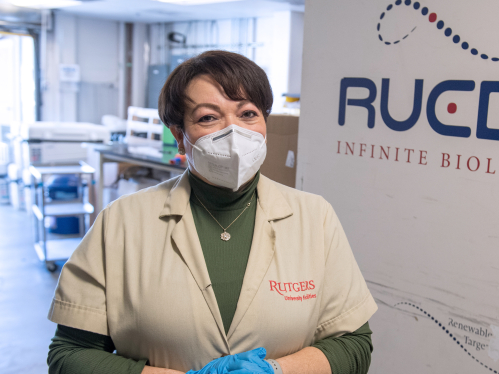
A Tighter Community Grows Out of a Challenging Time
The site of empty hallways and buildings at Rutgers University-Newark has been jarring to Yohanna Alcantara in the last year.
Leading Newark’s largest unit of staff as assistant director of Institutional Planning and Operations, Alcantara oversees Newark-IPO finance, custodial needs and service desk needs for the Newark community. While there have been fewer people on campus to serve, Alcantara and her team found opportunities to reinvent their work.
“We started on several projects around campus during this time. Custodial was able to improve sanitation methods, especially in hallways and other high-contact areas. Our service desk implemented new measures for other departments’ information and better processes for accessing that information as well.”
With a goal of mitigating concerns once campus populations return, Alcantara’s team aims to ease the anxiety of returning by assuring that safety is the top priority.
As if their work wasn’t enough, Alcantara’s team also assisted colleagues who were in need. Jumping in to help housing with cleaning and sanitation projects was a way for her team to show their care and love for the university and their roles in it.
“Being a leader during this time meant not just providing support for my staff, but to show them solidarity and respect for the jobs they are doing. That’s why I’m here, that’s why we are here – to say we see you, we support you and we are here to help.”
The work is not always easy. Staff members have had to navigate care for older family members, illness, loss and stress, while also managing their daily responsibilities and safety. “I care a lot about this job and I think that by coming here every day, I can lead by example. I have to show that we are not afraid. With COVID affecting a lot of minority communities and a majority of our staff being minorities, the fact that they’re here says, ‘If I’m here, you can be too.’”
What Alcantara values the most about this time has been the opportunity for her team to grow into a more unified force by facing the unknown together. “We have had time to really get to know each other better and share common experiences. One time we were cleaning and started singing along to the Ghostbusters song while testing a new disinfection gun (sprayer), and that small moment was a feeling of fun none of us had had for a while, which was really nice to have together.”
– Evie Duvert
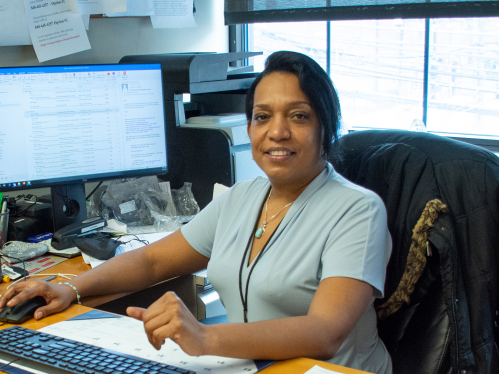
Supporting His Workers Through a Difficult Time
For Bob Smith, an operations manager who helps clean and sanitize buildings on the Cook/Douglass campus, the last year has been marked by the loss that is all around him. He oversees a group that includes six forepersons and 100 custodians. Throughout the year, he helped his team juggle absences as they dealt with deaths due to the pandemic and struggled to balance work and family obligations during a difficult time.
“Seeing the anguish of people who could not be with a sick or dying loved one, and not wanting to stress them at work is something I’ll always remember,’’ he said.
Last spring, Smith and his crew prepared a high-rise dorm for the possibility that medical personnel from Robert Wood Johnson University Hospital would need a place to stay to isolate from their families as they treated patients suffering from COVID-19. It turned out they didn’t need the space and his crew shifted to maintaining the buildings for people on campus.
“My staff and I have made a big difference in what we’ve had to do the past year,’’ he said. “We’ve always had some population of people on campus, and we have been cleaning and sanitizing and responding to work orders as we always do.’’
He missed going to football games this year. He is a season ticket holder usually in the stands cheering on the Scarlet Knights. Wearing masks and regular COVID-19 testing is what he thinks he will always remember from this time.
He is looking forward to having more people on campus.
“The buildings are meant to have people in them,’’ Smith said. “It’s easier to maintain and clean the buildings when they are full of people. They let us know if something is wrong or if something needs to be done.’’
The quiet at Rutgers has been unsettling for the people at work, he said.
“It’s weird being on campus with so little activity,’’ he said. “We just want to get back to as normal as possible.’’
– Elizabeth C. Crann
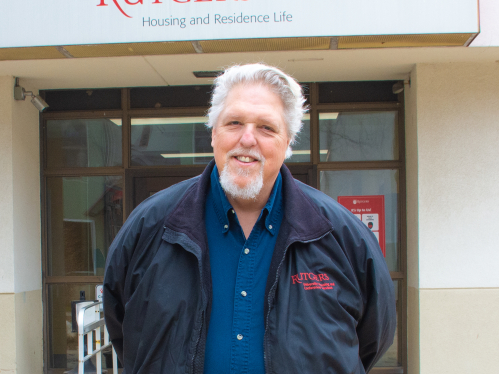



Being a leader during this time meant not just providing support for my staff, but to show them solidarity and respect for the jobs they are doing. That’s why I’m here, that’s why we are here – to say we see you, we support you and we are here to help.
Yohanna Alcantara, Rutgers-Newark
Preparing for the Return to Campus
Aida Santos misses hugs and high-fives and the thriving Rutgers-Camden campus she remembers from her days as an undergraduate economics major before the pandemic.
She is now a trusted, consistent presence as a member of the custodial services team making sure the university is ready for a return to the atmosphere she knew and loved.
“It’s very quiet and mostly vacant compared to my college days,” says Santos, a 2010 graduate. “I felt bad for the first-year students, who didn’t get the type of welcome that most first-year students get. Socializing is an important part of college life.”
Santos is counted on to sanitize offices and common areas – especially all high-contact points, like door handles – in the Paul Robeson Library and three Cooper Street buildings.
Like many, she is also busy juggling work and family life. She adjusted her work hours to help her 4-year-old daughter, Airey, attend virtual school meets. However, she notes, it’s been a family effort; when Airey’s older siblings, Dajah and Damir, are home, they help her prepare for school.
Santos also had to adjust to challenges as a business owner. When she is not working at the university, Santos and partner Corey Jones co-own and operate a commercial cleaning and maintenance business, Extreme Preservation LLC. Business has changed in the last year: some customers decreased or canceled services, while others requested extra sanitization services.
“So it has balanced out in some way or another,” she says. “At first it was difficult because we had to decrease our workers’ hours due to the lack of work, but as more places are opening back up, business is becoming busier.”
Reflecting on the pandemic, Santos says she will remember how people learned to appreciate the “minor things in life’’ that were taken for granted and “how personal space was not only suggested, but mandated.”
Now, she is excited for Rutgers-Camden to turn a new page.
“I’m looking forward to seeing a thriving campus again, filled with both familiar and new faces,” she says.
– Tom McLaughlin
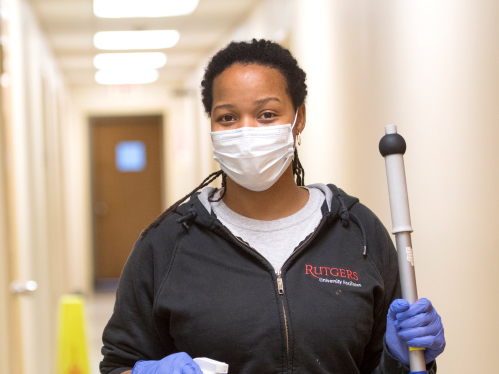
Keeping the Rutgers-Newark Community Connected
David Edward and his team spent the last year making sure members of the Rutgers-Newark community who have worked, taught and learned remotely during the COVID-19 pandemic had everything necessary to continue their jobs and their studies.
“We surveyed extensively to see what people needed to function from home, and then we worked to provide it all,” said Edward, an Office of Information Technology manager whose team moved quickly to develop a Student Technology LaunchPad and provide the hardware and support needed by students and employees as they dealt with the challenges of pandemic work and learning. “We could do some of it — like new website creation — while working from home, but much of it required us to be on campus.”
Edward’s team was on campus to distribute hundreds of loaner devices to students, faculty and staff at Rutgers-Newark, devices that have enabled recipients to keep teaching, learning and working while socially distancing. The team even installed laptop kiosks at Rutgers-Newark that provide daylong laptop loans.
“I never imagined when everyone went home that they’d be away for so long,” Edward said. “I miss all the colleagues I haven’t seen since last year. I even miss the people I do see here on campus because I still don’t get to socialize with them normally.”
Looking forward to the pandemic’s end, Edward is most excited about two things.
“I want to actually meet the people I have added to my team during the pandemic, people that I hired months ago but have never seen in the flesh,” Edward said. “I also want to see all the people on campus go back to patronizing the restaurants and shops that surround us and depend so much upon the business we provide.”
– Andrew Smith
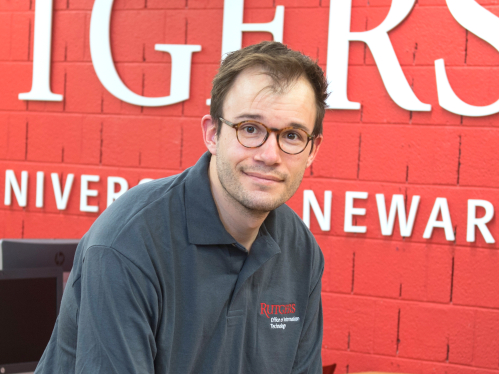
Through the Pandemic and Record Snow, Rutgers Police Dispatch Never Stopped
Emergencies don’t stop during a pandemic.
No one knows that better than Jennifer Downey, a 911 dispatcher for the Rutgers University Police Department (RUPD).
Downey, 29, has worked the nightshift taking 911 and non-emergency calls for all Rutgers campuses and for the City of New Brunswick throughout the state lockdown and year of remote learning.
“Things were definitely unusual, so there were many new situations that arose during this time, but we did our best to conform and provide solutions for every incident,” she said. “People were making complaints about indoor dining, music from outdoor dining and social gatherings. With the ever-changing COVID rules, it was difficult to keep up.”
Prior to starting with Rutgers a little more than a year ago, Downey worked for nonprofit organizations. When she began looking for a new career path dispatching seemed like a good fit because it allows her to continue helping others.
“The more I learned about it the more I thought that this is something I could picture myself doing long term, so I got my certifications and applied to RUPD and have been enjoying it ever since,” she said.
Though most Rutgers students and faculty haven’t been on campus, Downey said she and her colleagues take seriously their role supporting the needs of those who did remain at Rutgers-New Brunswick – as well as the surrounding community. This winter that meant battling some rough weather – including multiple snowstorms – to make it into work. And as an essential worker, Downey, who lives in East Brunswick with her parents and brother, regularly sacrifices holiday celebrations with her family, and the pandemic was no different.
“I will always remember how my coworkers came together each day as a team and never complained,” she said. “Though things were different, everyone was open to the new changes and we continued to come to work each day and get used to our new norm.”
Downey and the RUPD team are looking forward to the fall when more students, faculty and staff will return to campus.
“The dispatch center has been much quieter without students and staff on campus, so it will be nice for things to go back to normal operations,” she said.
– Lisa Intrabartola
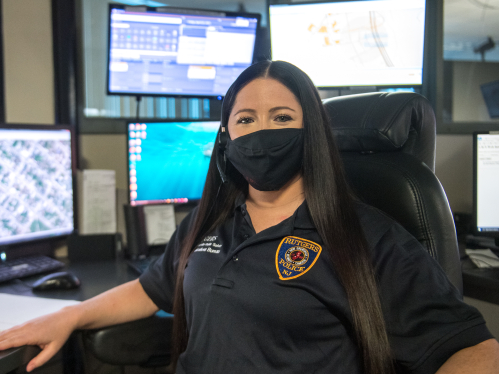



I will always remember how my coworkers came together each day as a team and never complained. Though things were different, everyone was open to the new changes and we continued to come to work each day and get used to our new norm.
Jennifer Downey, 911 dispatcher, Rutgers University Police Department
A Son of Rutgers-Camden Shows Dedication to Keep the University Running
Byron Diggs, a foreperson in custodial services at Rutgers-Camden, is looking forward to a time beyond the COVID-19 pandemic when he can get back to collaborating and socializing with his colleagues in person.
For the past year, Diggs and the 24 custodial employees he supervises have worked vigorously to stop the spread of the coronavirus. This has meant adding more tasks to their daily cleaning schedule. Rooms in high-volume areas like the Athletic Center and Campus Center are sanitized in between all meetings and events with more attention being given to high-contact areas – glass doors, doorknobs and railings.
“I think we’ve made a difference on campus this last year by working together to keep our campus community sanitized and safe for all,” says Diggs. “I say we because it takes our entire staff to successfully run our environment. I could not do this by myself, it takes a strong competent village.”
Keeping students, faculty and staff safe is important to Diggs, whose mother worked as an administrative assistant in the Educational Opportunity Fund (EOF) program at Rutgers-Camden for 40 years before retiring in 2012.
Growing up at Rutgers made a positive impact on his life. He remembers going to work with his mother on “Bring Your Child to Work Day,” watching EOF students begin summer programs, meeting faculty and being excited to watch Rutgers men’s basketball games.
“I’ve been on the Camden campus since I was born and I’ve never seen anything like this,” Diggs says. “So, with the trust and support of my director, supervisor, and staff, it means a lot to me to be able to contribute to keeping the university running.”
Meanwhile, he believes the support he receives from his family will continue to keep him humble and energized to handle responsibilities at home and at work.
“I will remember the growth and support of myself with my family, staff, coworkers and friends striving together to survive during this chaotic time,” Diggs says.
– Robin Lally
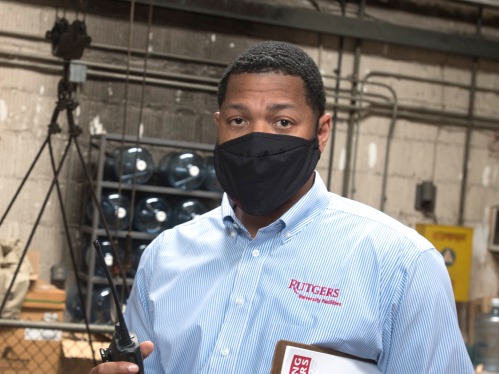
Leading a Team of Heroes
Tom Cunningham, who manages custodial services for the Busch campus and 33 Knightsbridge Road, has made it one of his primary responsibilities to provide emotional support during a fearful time.
“Our custodians needed to be here this past year and I was right here with them,’’ Cunningham said. “Much of the work we have been doing helped to keep the virus at bay and to make people feel safer while they were on campus.’’
While his staff came to work to make the campus safe for everyone, they dealt with their own health and safety concerns and Cunningham was there to help them feel secure.
"It was important to keep the employees' spirits up and focused on the tasks at hand to provide a clean, safe environment for everyone on campus,’’ he said.
Part of Cunningham’s responsibilities include coordinating waste management for the university. He oversees participation in the Recyclemania program, a competition that has earned Rutgers repeated recognition for its efforts to reduce waste on campus. Even with fewer people on campus, it’s remained a focus of his work.
“The most important reason for Rutgers' involvement in this competition each year is to increase awareness about the importance of recycling and sustainability,’’ he said. “This positive message is even more important at a time when the university community has experienced so many challenges.’’
Throughout everything in the last year, supporting his employees, keeping them motivated and guiding them through the unknown has been a top priority.
“We all had to juggle things. I worked with all of the employees in my department on a case-by-case basis to address their needs,’’ he said. “The university was very generous and flexible in making sure staff was able to take time off when needed and not be financially impacted. We were all able to weather the storm and now things are looking up, and many of those who have been home are returning to work.”
Cunningham said he will always remember the importance of the role his group played. “We were on the front line during a worldwide pandemic. I am also thankful that our custodial staff had the training needed to meet the challenges they faced during this difficult time. They are heroes and I am proud to be a part of that team.”
– Elizabeth C. Crann
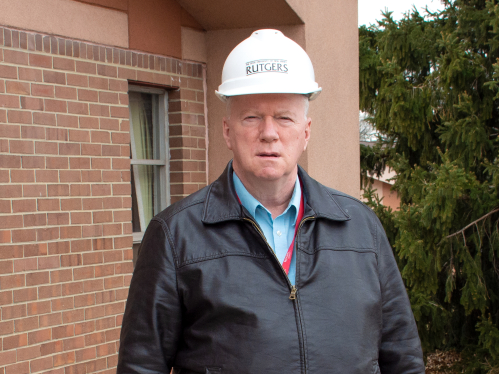
At the Computer Lab, Open for Students on a Quiet Campus
The Rutgers-New Brunswick computer labs may lack their normal bustle, but they still provide vital services to the small number of students who have returned to Rutgers in person.
“We’ve had more than 6,000 users since we reopened in September, and we’ve fulfilled more than 15,000 requests for curbside printing pickup. Those numbers are obviously way lower than normal, but we still have a very significant number of students depending on us,” said Winnie Ling Luper, who manages the Office of Information Technology computer labs on Busch campus.
Ling Luper was nervous when she first began coming to campus every day and reconfiguring the labs to ensure social distancing, but she and her staff have grown comfortable. “That’s not to say we’ve relaxed our precautions, but we have grown to trust that if we take the proper precautions, we’ll be OK,” she said. “It’s been six months, and contact tracing hasn’t traced a single transmission to the computer labs.”
Throughout the pandemic, Ling Luper has been repeatedly impressed by the creativity and flexibility of everyone, from her team members at the computer labs to the largest departments at Rutgers. “Huge organizations tend to move slowly,” she said, “but Rutgers has shown that it can be nimble when it needs to be. Changing conditions have made us change our plans again and again this year, and leadership has supported us all the way.”
Still, Ling Luper will be as glad as anyone when things return to normal. “My favorite thing about this job has always been the students – the student employees, the students who use the labs, and the students I see on campus. I really can’t wait for them to come back.”
– Andrew Smith
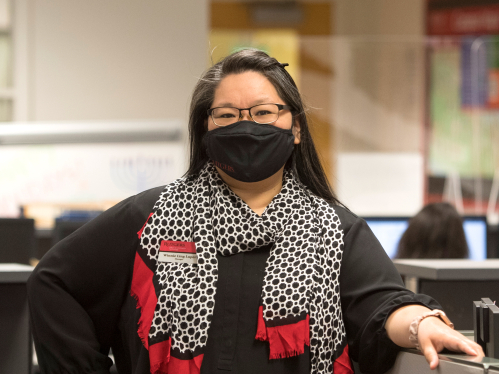



More Stories From the Front Lines
In case you missed it, here are some stories our essential workers shared last summer.